- Home
- Frank Herbert
The Jesus Incident Page 17
The Jesus Incident Read online
Page 17
The people were taking a devilish long time to get settled, moving about, forming groups. Oakes waited with what show of patience he could muster. There was a dank, metallic smell in the room which he did not like. And the lights had been tuned too far into the green. He glanced back at the Demarest woman. She was a slight figure with unremarkable features and dull brown hair. She was notable only for her intensely nervous mannerisms. Demarest had been the instigator of the election—a petition-bearer. Oakes managed a smile when he looked at her. Lewis had said he knew how to defuse her. Knowing Lewis, Oakes did not probe for details.
Presently, Rachel Demarest came forward on the platform. Leaving her wand-amplifier on its clip at her wrist, she raised both arms, twisting her palms rapidly. It was interesting that the room fell silent immediately.
Why didn’t she use her amplifier? Oakes wondered. Was she an anti-tech?
“Thank you all for coming,” she said. Her voice was high and squeaky with a whine at the edge. “We won’t take much of your time. Our Ceepee has a copy of your petition and has agreed to answer it point by point.”
Your petition! Oakes thought. Not my petition. Oh, no.
But evidence from Lewis and Murdoch was clear. This woman wanted a share in Colony power. And she had managed most cleverly to say Ceepee with an emphasis which made the title appear foolish. Battle, therefore, was joined.
As Demarest stepped back, glancing at him, Oakes produced the petition from an inner pocket of his white singlesuit. Making it appear accidental, he dropped the petition. Several pages fluttered off the platform.
“No matter.” He waved back people in the front row as they moved to recover the pages. “I remember everything in it.”
A glance at Murdoch brought him a reassuring nod. Murdoch had found chairs for himself and Demarest. They sat well back on the platform now.
Oakes hunched forward toward his audience in a gesture of confidence, smiling. “Few of our people are here this morning and you all know the very good reasons for this. Pandora is unforgiving. We all lost loved ones in the four failures on Black Dragon.”
He gestured vaguely westward where the rocky eminences of Black Dragon lay hidden beyond the mists of more than a thousand kilometers of ocean. Oakes knew that none of those failures could be laid at his hatch; he had been very careful about that. And his presence permanently groundside imparted a feeling of excitement about Colony prospects here on the undulating plains of The Egg. That sense of impending success had contributed to the confrontation brewing in this room. Colonists were beginning to think beyond the present state of siege, rubbing their wishes together, shaping their desires for personal futures.
“As most of you know.” Oakes said, lifting his amplifier to make his voice carry, “I am groundside to stay, groundside to direct the final push for victory.”
There was a polite spatter of applause, much less than he had expected. It was high time he came groundside! He had loyalties to weld, organization to improve.
“The Demarest petition, then,” he said. “Point One: elimination of one-man patrols.” He shook his head. “I wish it could be done. Perhaps you don’t understand the reason for them. I’ll put it plainly. We are conditioning the animals of Pandora to run like hell when they see a human!”
That brought a rewarding burst of applause.
Oakes waited for it to subside, then: “Your children will have a safer world because of your bravery. Yes, I said your children. It is my intent to bring the Natali groundside.”
Shocked murmurs greeted this announcement.
“This will not happen immediately,” Oakes said, “but it will happen. Now—Point Two of the Demarest petition.” He pursed his lips in recollection. “ ‘No major decision about Colony risks or expansion shall be made without approval by a clear majority of Colonists voting in Council. Do I have that right, Rachel?” He glanced back at her but did not wait for her to respond.
Glancing once more at the scattered papers of the petition on the floor below him, he looked hard at the front row and swept his gaze across the audience.
“Putting aside for the moment the vagueness in that word ‘clear’ and this unexplained concept of ‘Council,’ let me point out one thing we all know. It took ten hours to clear this room for a meeting. We have a choice. We keep this hall clear and ready at all times, thereby putting a dangerous strain on production facilities, or we accept a ten-hour delay for every major decision. I prefer to call those survival decisions, by the way.” He made a show of looking back at the large wall chrono, then returned his attention to the audience. “We’ve already been here more than fifteen minutes and obviously we will use more time on this.”
Oakes cleared his throat, giving them a moment in which to absorb what he had said. He noted a few squirmers in the audience sending signals that they would like to comment on this argument, and he had not missed the fact that Murdoch had taken Rachel Demarest’s arm, whispering in her ear and, incidentally, keeping her from interrupting.
“Point Three,” Oakes said. “More rest and recuperation back on the ship. If we . . .”
“Ship!” Someone in the middle rows shouted. Oakes identified the speaker, a guard on the hangar perimeter squad, one of Demarest’s supporters. “Not the ship, but Ship!” The man, half out of his seat, was pulled back by a companion.
“Let’s face that then,” Oakes said. “I presume that a Chaplain/Psychiatrist has a modicum of expertise with which to address this question?”
He glanced at Rachel Demarest who still was being held quietly but firmly by Murdoch. You want to use titles? Very well, let us put this title into its proper perspective. Not Ceepee, but Chaplain/Psychiatrist. All the traditions of THE ship stand behind me.
“I will spell it out for you,” Oakes said, turning once more to the audience. “We are a mixed bag of people. Most of us appear to have come from Earth where I was born. We were removed by the ship . . .”
“Ship saved you!” That damned guard would not stay silent. “Ship saved you! Our sun was going nova!”
“So the ship says!”
Oakes gave it a bit more volume by a touch on his wand’s controls. “The facts are open to other interpretation.”
“The facts . . .”
“What have we experienced?” Oakes drowned him out and then reduced the volume. “What have we experienced?” Lower volume still. “We found ourselves on the ship with other people whose origins are not clear, not clear at all. Some clones, some naturals. The ship taught us its language and controlled our history lessons. We learn what the ship wants us to learn. And what are the ship’s motives?”
“Blasphemy!”
Oakes waited for the stir of this outcry to subside, then: “The ship also trained me as a doctor and a scientist. I depend on facts I can test for myself. What do I know about Shipmen? We can interbreed. In fact, this whole thing could be a genetic . . .”
“I know my origins and so does everyone else!” It was Rachel Demarest breaking away from Murdoch and leaping to her feet. She still was not using her wand, but she fumbled with it as she moved toward Oakes. “I’m a clone, but I’m from . . .”
“So the ship says!”
Again, Oakes hurled that challenge at them. Now, if Lewis and Murdoch had read the Colonists correctly, suspicions had been placed like barbs where they would do the most good when the vote was called.
“So the ship says,” Oakes repeated. “I do not doubt your sincerity; I merely am aghast at your credulity.”
She was angered by this and, still fumbling with her wand, failed to give herself enough amplification when she said: “That’s just your interpretation.” Her voice was lost on all but the first rows.
Oakes addressed the audience in his most reasonable manner: “She thinks that’s just my interpretation. But I would be failing you as your Chaplain/Psychiatrist if I did not warn you that it is an interpretation you must consider. What do we know? Are we merely some cosmic experiment in genetics? We k
now only that the ship . . .” He gestured upward with his left thumb. “. . . brought us here and will not leave. We are told we must colonize this planet which the ship calls Pandora. You know the legend of Pandora because it’s in the ship’s educational records, but what do you know about this planet? You can at least suspect that the name is very appropriate!”
He let them absorb this for several blinks, knowing that many among them shared his suspicions.
“Four times we failed to plant a Colony over on Black Dragon!” he shouted. “Four times!”
Let them think about their lost loved ones.
He glanced at Rachel Demarest, who stood three paces to his left, staring at him aghast.
“Why this planet and not a better one?” Oakes demanded. “Look at Pandora! Only two land masses: this dirt under us which the ship calls The Egg, and that other one over there which killed our loved ones—Black Dragon! And what else has the ship given us? The rest of Pandora? What’s that? A few islands too small and too dangerous for the risking. And an ocean which harbors the most dangerous life form on the planet. Should we give thanks for this? Should we . . .”
“You promised to take up the entire petition!”
It was Rachel Demarest again and this time with her amplifier turned up too far. The intrusion shocked the audience and there were clear signs that many found the shock offensive.
“I will take it up, Rachel.” Very soft and reasonable. “Your petition was a needed and useful instrument. I agree that we should have better procedures for work assignments. Calling this deficiency to my attention strengthens us. Anything which strengthens us meets my immediate approval. I thank you for it.”
She got her wand under control.
“You imply that the ’lectrokelp is the most dangerous . . .”
“Rachel, I already have started a project which will try to determine if there is something useful to us about the kelp. The director of that project and one of his assistants are sitting right down there.”
Oakes pointed down at Thomas and Waela, saw heads turned, people craning to see.
“Despite the dangers,” he said, “very potent and obvious dangers, as anyone will agree who has studied the data from these oceans, I have started this project. Your petition comes after the fact.”
“Then why couldn’t we have learned this when . . .”
“You want more open communication from those of us making the decisions?”
“We want to know whether we’re succeeding or failing!” Again, she had her amplifier turned too high.
“Reasonable,” Oakes said. “That is one of the reasons I have moved myself and my staff permanently groundside. In my head . . .” He tapped his skull. “. . . is the complete plan to make Pandora into a garden planet for . . .”
“We should have Council members on . . .”
“Rachel! You propose having your people at key positions? Why your people? What record of success do they have?”
“They’ve survived down here!”
Oakes fought to conceal anger. That had been a low blow. She implied that he had remained safely ensconced shipside while she and her friends risked Pandora’s perils. A reasonable tone was the only way to meet that challenge.
“I’m down here now,” he said. “I intend to stay. I will submit to your questions at any mutually acceptable time, despite the fact which we all know—time taken to debate our problems could be used to better advantage for Colony as a whole.”
“Will you answer our questions today?”
“That’s why I called this meeting.”
“Then what’s your objection to having an elected Council which . . .”
“Debating time, just that. We don’t have the time for such a luxury. I agreed with those who objected that this meeting took us away from more important work, from food. But you insisted, Rachel.”
“What’re you doing over on Black Dragon?” That was the objectionable perimeter guard down in the audience, taking a new tack now.
“We are attempting to build another foothold for Colony over on Dragon.”
Reasonable . . . reasonable, he reminded himself. Keep your voice reasonable.
“Dividing your energies?” Rachel Demarest demanded.
“We are using new clones provided by the ship’s facilities,” he said. “Jesus Lewis is out there now directing the effort. I assure you that we are risking only new clones who fully understand the nature of their involvement.”
Oakes smiled at Rachel Demarest, recalling Murdoch’s jocular admonition: “A few lies don’t hurt when you’ve given them some truth to admire.”
Turning back to face the audience, Oakes said: “But this diverts us from the orderly resolution of our meeting. Rather than waste our time this way, we should take the issues one at a time.”
His announcement about the attempt at Dragon had served its purpose, though. His listeners (even Rachel Demarest) were absorbing the implications with varying degrees of shock.
Someone away in the right rear quadrant of the room shouted: “What do you mean new clones?”
Silence followed his demand, a waiting silence which said it spoke a question in the minds of most.
“I’ll let Jesus Lewis speak to that at another meeting. It’s a technical question about matters which have been under his direct supervision. For now, I can say that the new clones are being bred and conditioned to defeat the perils we all know exist out on Dragon.”
There: Lewis was prepared with subtle lies and half truths. The injection of rumors and key elements of their prepared story into Colony’s grapevine would tie this issue down. Most people would accept the prepared story. It was always better to know that someone else was going into danger, sparing you that necessity.
“You didn’t answer our question about rest and recuperation,” Rachel Demarest accused.
“You may not realize it, Rachel, but the schedule of shipside R & R is the most important issue before us today.”
“You’re not going to buy us off with shipside time!” she said. She was clenching her wand with both hands, pointing it at him like a weapon.
“Again, I am aghast at your limited perception,” Oakes said. “You really are not fit to be making the decisions which you ask the power to make.”
At this direct attack, she backed two steps away from him, glared into his eyes.
Oakes shook his head sadly. “You have a friend down there brave enough to state the essential problem . . .” Oakes pointed down at the perimeter guard who sat in red-faced anger. (Have to watch that one. A fanatic for sure.) “. . . but not brave enough nor perceptive enough to see the full implications of his emotional outburst.”
That did it. The man was on his feet and shaking a fist at Oakes. “You’re a false Chaplain! If we follow you, Ship will destroy us!”
“Oh, sit down!”
Oakes used almost the full amplification to drown out the man’s voice. The sound-shock provided the man’s companions with the interval to pull him back into his seat.
Turning down the amplifier, Oakes asked: “Who among you asks what I ask? An obvious question: Where did WorShip originate? With the ship. That ship!”
He thrust a pointing finger ceilingward. “You all know this. But you don’t question it. As a scientist, I must ask the hard physical questions. Some among you argue that the ship has been motivated by the wish to save us—a beneficent savior. Some of you say WorShip is a natural response to our savior. Natural response? But what if we are guinea pigs?”
“What are your origins, Oakes?”
That was Rachel Demarest again. Beautiful. She could not have performed better for him had she been programmed. Didn’t she know that by the best guess, the naturals outnumbered the clones almost four to one?—perhaps even more. And she already had admitted to being a clone.
“I was a child of Earth,” Oakes said, and once more his voice was its most reasonable. He looked directly at her, then back at the audience. A little barbering of the
truth was called for now. No need to bring up the fact that old Edmond Kingston had chosen him as successor. “Most of you know my history. I was taken by the ship and trained as Chaplain/Psychiatrist. Don’t you understand what that means? The ship directed my training to lead WorShip! Don’t any of you find something strange in this?”
Right on cue, Rachel intruded: “That seems the most natural . . .”
“Natural?” Oakes allowed free reign to his rage. “A mirror and recorder would have done just as good a job as such a Chaplain! If we have no free will, our WorShip is sham! How can the ship expect to condition me for such a task? No! I question what that ship tells us. I don’t even doubt. I question! And I don’t like some of the answers.”
This was public blasphemy on a scale few of them had ever imagined. Coming from the Chaplain/Psychiatrist it amounted to an open revolt. Oakes allowed the shock to become well seated in them before hammering it home. He raised his face to the domed ceiling and shouted: “Why don’t you strike me dead, Ship?”
The hall became one long-held breath while Oakes turned and smiled at Murdoch, then turned the smile on his audience. He reduced the amplifier volume to the minimum required for reaching the hall’s extremities.
“I obey the ship because the ship is powerful. We are told to colonize this planet? Very well. That is what we are doing and we are going to succeed. But who can doubt that the ship is dangerous to us? Have you had enough food lately? Why is the ship reducing our food supplies? I am not doing this. Send a deputation shipside if you wish to verify this.” He shook his head from side to side. “No. Our survival requires that we depend as little as possible upon the ship, and . . . eventually, no dependence upon the ship at all. Buy you with shipside time, Rachel? Hell no! I intend to save you by freeing you from the ship!”

 Direct Descent
Direct Descent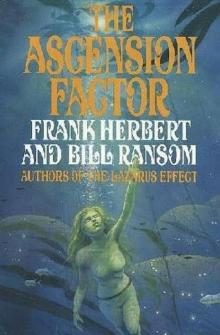 The Ascension Factor
The Ascension Factor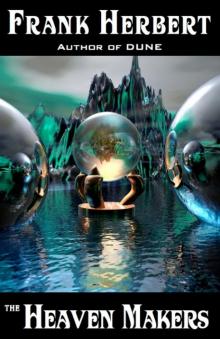 The Heaven Makers
The Heaven Makers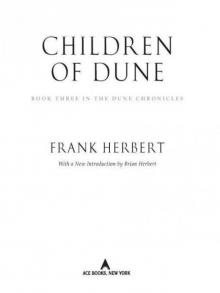 Children of Dune
Children of Dune Old Rambling House
Old Rambling House Dune
Dune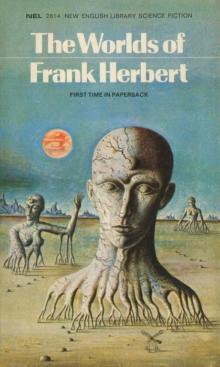 The Worlds of Frank Herbert
The Worlds of Frank Herbert The Jesus Incident
The Jesus Incident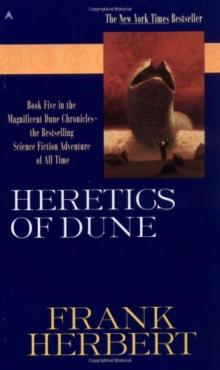 Heretics of Dune
Heretics of Dune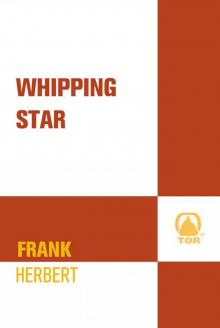 Whipping Star
Whipping Star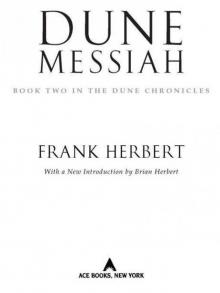 Dune Messiah
Dune Messiah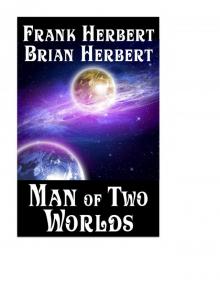 Man of Two Worlds
Man of Two Worlds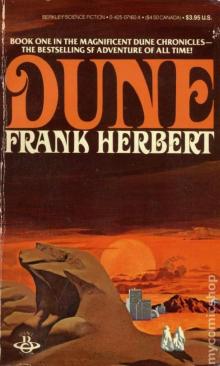 The Book of Frank Herbert
The Book of Frank Herbert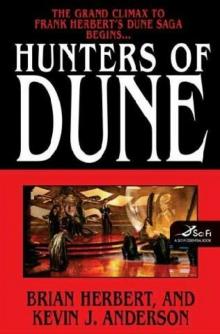 Hunters Of Dune
Hunters Of Dune The Tactful Saboteur
The Tactful Saboteur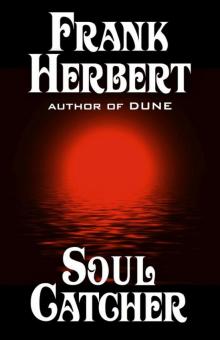 Soul Catcher
Soul Catcher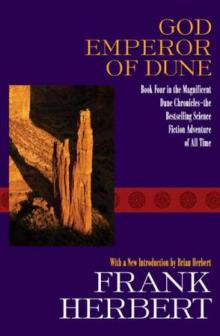 God Emperor of Dune
God Emperor of Dune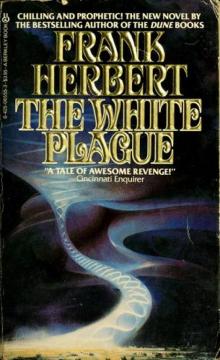 The White Plague
The White Plague The Green Brain
The Green Brain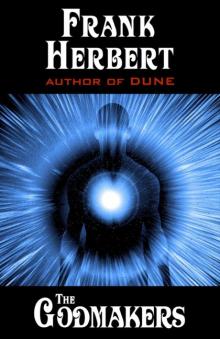 The Godmakers
The Godmakers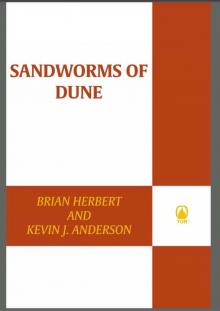 Sandworms of Dune
Sandworms of Dune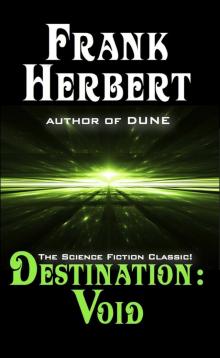 Destination Void
Destination Void The Dosadi Experiment
The Dosadi Experiment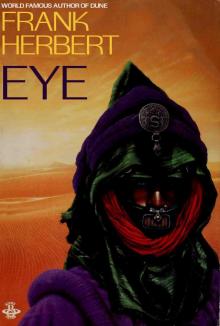 Eye
Eye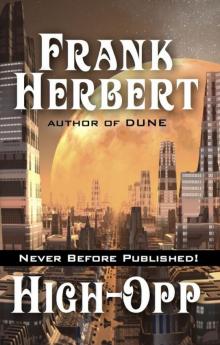 High-Opp
High-Opp The Eyes of Heisenberg
The Eyes of Heisenberg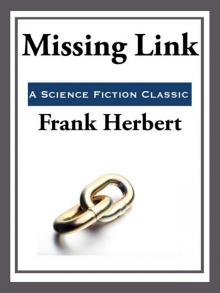 Missing Link
Missing Link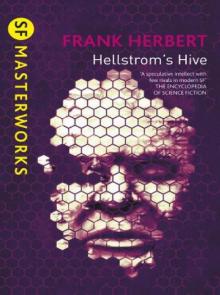 Hellstrom's Hive
Hellstrom's Hive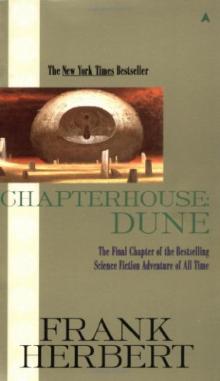 Chapterhouse: Dune
Chapterhouse: Dune The Santaroga Barrier
The Santaroga Barrier The Dragon in the Sea
The Dragon in the Sea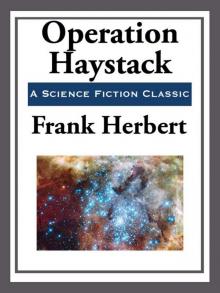 Operation Haystack
Operation Haystack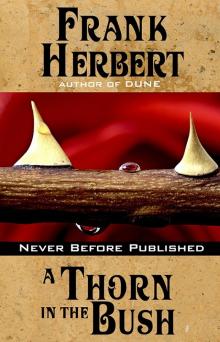 A Thorn in the Bush
A Thorn in the Bush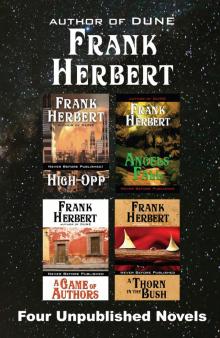 Four Unpublished Novels
Four Unpublished Novels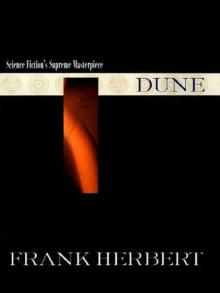 Dune dc-1
Dune dc-1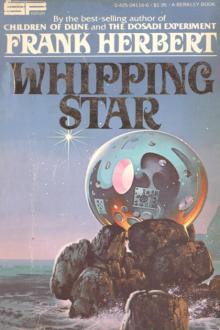 Jorj X. McKie 1 - Whipping Star
Jorj X. McKie 1 - Whipping Star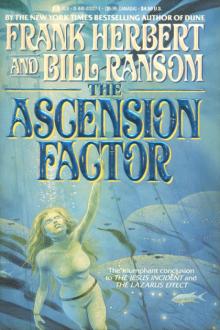 DV 4 - The Ascension Factor
DV 4 - The Ascension Factor Frank Herbert - Dune Book 4 - God Emperor Of Dune
Frank Herbert - Dune Book 4 - God Emperor Of Dune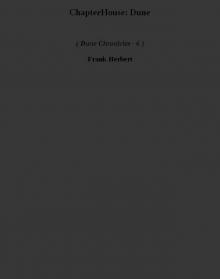 ChapterHouse: Dune dc-6
ChapterHouse: Dune dc-6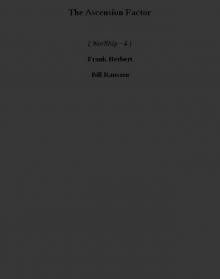 The Ascension Factor w-4
The Ascension Factor w-4 A Game of Authors
A Game of Authors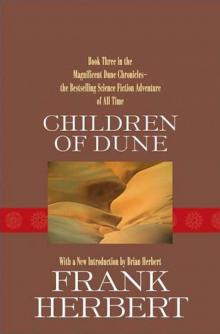 Children of Dune dc-3
Children of Dune dc-3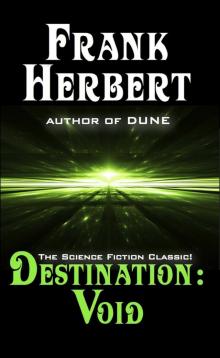 Destination: Void: Prequel to the Pandora Sequence
Destination: Void: Prequel to the Pandora Sequence The Collected Stories of Frank Herbert
The Collected Stories of Frank Herbert Dune Messiah dc-2
Dune Messiah dc-2 Frank Herbert - Dune Book 5 - Heretics of Dune
Frank Herbert - Dune Book 5 - Heretics of Dune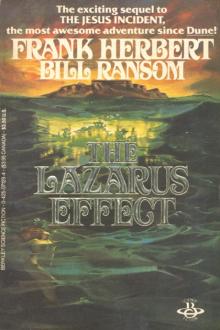 DV 3 - The Lazarus Effect
DV 3 - The Lazarus Effect The Jesus Incident w-2
The Jesus Incident w-2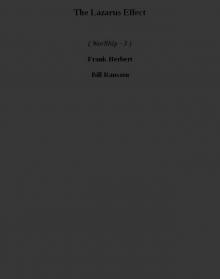 The Lazarus Effect w-3
The Lazarus Effect w-3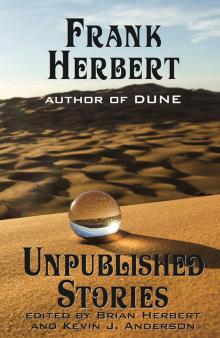 Frank Herbert
Frank Herbert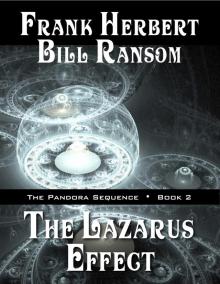 The Ascension Factor: Pandora Sequence
The Ascension Factor: Pandora Sequence Dune (40th Anniversary Edition)
Dune (40th Anniversary Edition)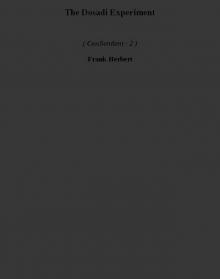 The Dosadi Experiment c-2
The Dosadi Experiment c-2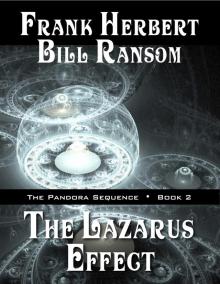 The Lazarus Effect
The Lazarus Effect God Emperor of Dune dc-4
God Emperor of Dune dc-4 The Pandora Sequence: The Jesus Incident, the Lazarus Effect, the Ascension Factor
The Pandora Sequence: The Jesus Incident, the Lazarus Effect, the Ascension Factor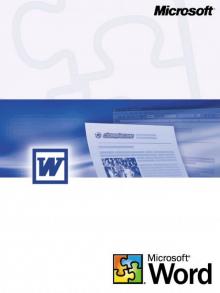 The Green Brain (v4.0)
The Green Brain (v4.0)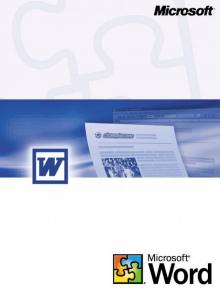 The Heaven Makers (v4.0)
The Heaven Makers (v4.0) Heretics of Dune dc-5
Heretics of Dune dc-5